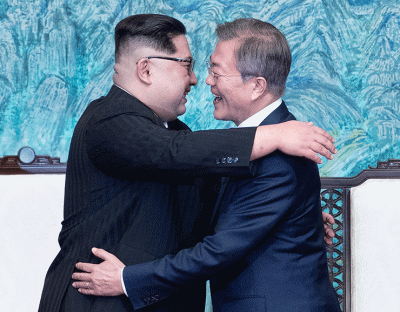Koreas Agree to Call for Formal End to War This Year

Featured image: South Korean President Moon Jae-in and North Korean leader Kim Jong-un embrace each other after releasing a joint statement at the truce village of Panmunjeom, Friday. (Source: Korea Summit Press Pool)
South and North Korea will seek to hold tripartite talks with the United States, or talks including China, with the goal of declaring an end to the Korean War (1950-53) this year and establishing permanent peace on the Korean Peninsula, President Moon Jae-in and North Korean leader Kim Jong-un announced Friday.
In a joint declaration they announced after their summit at the truce village of Panmunjeom, the two leaders reaffirmed the two Koreas’ joint goal of making the Korean Peninsula nuclear-free through complete denuclearization.
To attain these goals and for further discussions on the North Korea nuclear issue, Moon will visit Pyongyang this autumn.
Moon and Kim signed the “Panmunjeom Declaration for Peace, Prosperity and Unification of the Korean Peninsula,” in which they made clear there would be no more war on the peninsula and that a new era of peace has begun.
“South and North Korea will actively cooperate to establish a permanent and solid peace regime on the Korean Peninsula,” the declaration read.
The leaders reaffirmed their commitment to non-aggression and agreed on gradual arms reduction if military tensions are reduced and military confidence is built between the two Koreas.
“During this year that marks the 65th anniversary of the Armistice, South and North Korea agreed to actively pursue trilateral meetings involving the two Koreas and the United States, or quadrilateral meetings involving the two Koreas, the United States and China with a view to declaring an end to the War and establishing a permanent and solid peace regime,” the declaration read.
“South and North Korea confirmed the common goal of realizing, through complete denuclearization, a nuclear-free Korean Peninsula.”
Moon said,
“North Korea’s pre-emptive nuclear freeze will be a valuable beginning for complete denuclearization of the peninsula,” referring to the North’s recent announcement to suspend nuclear and missile tests and shut down its nuclear test site.
Kim said he gravely understood the wishes and expectations of all the people of the two Koreas.
“We confirmed the strong determination to open a new era in which all Korean people can enjoy prosperity and happiness in a peaceful land where there is no war, and agreed on practical measures for this,” he said. “I’m making efforts so that the agreement we made today will not become like previous agreements which have not been carried out, but will produce a good outcome.”
In the joint declaration, the two Koreas agreed to play their roles and take responsible actions for denuclearization of the peninsula, and make efforts to gain international support for it.
Moon and Kim agreed to talk over peninsula issues and build trust through regular summits and hotline talks. Moon will also visit Pyongyang this autumn, they said.
To relieve military tension and reduce the possibility of war, the South and the North decided to halt any hostile activities.
From May 1, they will stop propaganda broadcasting over the inter-Korean border, and make the Demilitarized Zone (DMZ) a peace zone where there are no military weapons.
The two Koreas will also hold military talks often, with the earliest ones planned for May.
For improvement of inter-Korean relations, the two Koreas decided to hold talks in various fields as soon as possible, and open a liaison office in Gaeseong, North Korea, where officials from the two Koreas will be posted, for non-governmental exchanges.
They will seek to hold joint events across all sectors of society, and jointly participate in international sports events such as the 2018 Asian Games. They will also hold Red Cross talks for the reunion of separated families, planning to hold the earliest event on Liberation Day, Aug. 15.
The two Koreas will also seek various cooperative projects agreed on by an earlier joint declaration after the 2007 inter-Korean summit.
“Today I and Kim set a milestone, which will not be shaken, toward co-prosperity and unification,” Moon said. “We can give a good present to the South, the North and the world with Kim’s resolute decision. How to announce it was also special. It was the first time for a North Korean leader to make a joint announcement in front of the world’s press after a summit. I’m applauding Kim for making such an audacious and brave decision.”
Kim said,
“If the people of the two Koreas can pass on the road I passed today, if Panmunjeom, which is the symbol of a painful division, becomes a symbol of peace, the two Koreas which share the same blood, language, history and culture will become one as they used to be and enjoy endless joint prosperity.”
During the 100-minute talks in the morning, the two leaders agreed on most parts of the agreement. The afternoon discussion was held among delegates, without the leaders, to fine-tune the terms of the declaration.
Two Korean leaders agree as follows in Panmunjeom Declaration
(1) Two Koreas agree to declare the end of the Korean War that has been suspended since an armistice agreement in 1953.
(2) Two Koreas agree to set denuclearization as a common goal and work together to make the Korean Peninsula nuclear free.
(3) South Korean President Moon Jae-in will visit Pyongyang in autumn.
(4) Two Koreas agree to stop a range of hostile acts on the ground, in the air and on the ocean.
(5) Starting May 1, the two Koreas will stop broadcasting propaganda on the inter-Korean border.
(6) Two Koreas will set up a jointly operated liaison office in Gaeseong, North Korea.
(7) On Aug 15, the two Koreas will host reunions of families separated by the 1950-53 Korean War.
(8) Two Koreas agreed to reconnect an inter-Korean railroad on the East Coast.
(9) Two Koreas will jointly participate in the 2018 Asian Games.

